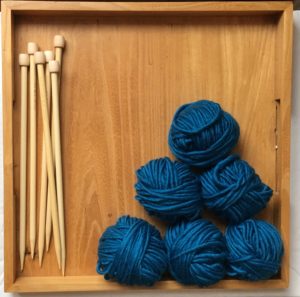In the past year I have been experimenting with offering to teach my students the basics of knitting and then inviting them to knit during class if it helps them concentrate on listening and participating.
I have been astounded even in this short span of time at how the students who learn to knit have reported that it has improved their concentration and helped them feel more engaged during class. I have been delighted to see how a student will offer a very astute observation in a class discussion, while completing a row of knitting.
This past January, several members of the St. Mary’s College women’s basketball team who were in my class told me that knitting was helping them in the time before and after games in processing what was happening on the court. They also found ways to make knitting a team activity, making a scarf that contained each team member’s stitches.
This experience encouraged me to deepen my own inquiry into how I can incorporate knitting into an interdisciplinary practice. Currently in my Ecopoetics class at SFAI, several students have learned to knit and they bring their knitting to class and once again they are sharing with me that being able to work with their hands helps them stay focused during our discussions. As they assimilate ideas, they are engaging with the properties of the yarn and the responsiveness of the process itself. The attention the process requires is both open and focused and this creates an engaged presence around the table in the classroom. Far different from when a student is glancing at their phone under the desk.
I like the idea of having a tray of yarn and needles in the classroom that students can have at hand. The idea isn’t even necessarily to make something, though of course that happens. Some students actually just unravel what they did after class and rewind the ball, making it very much just about the process. Others are very pleased to have made something they can give to someone and they find that being able to complete something as manageable as a scarf helps them feel more confident in other more complex endeavors.

